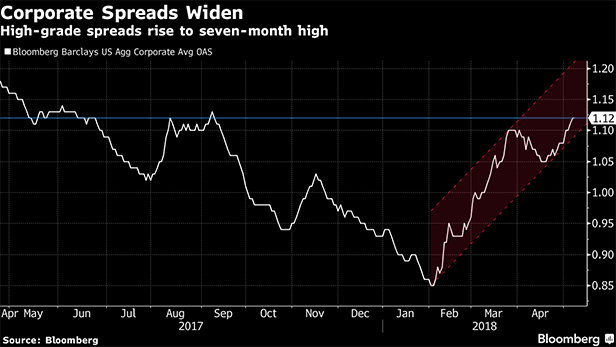Corporate America partied like never before on cheap money over the past decade, and now comes the hangover.

Companies will need to refinance an estimated US$4 trillion of bonds over the next five years—about two-thirds of all their outstanding debt, according to Wells Fargo Securities. This has investors concerned. Rising rates mean it will cost more to pay for unprecedented amounts of borrowing, which could push balance sheets toward a tipping point. And on top of that, many see the economy slowing down at the same time the rollovers are peaking.
“If more of your cash flow is spent into servicing your debt and not trying to grow your company, that could, over time, if enough companies are doing that, lead to economic contraction,” said Zachary Chavis, a portfolio manager at Sage Advisory Services Ltd. in Austin, Texas. “A lot of people are worried that could happen in the next two years.”
These concerns seem to be leaking into the market. A Bloomberg Barclays gauge of average corporate bond spreads has surged to a seven-month high since reaching an all-time low in early February. This has happened at the same time as 10-year Treasury yields have inched toward 3 percent.
 About $3 trillion of the debt coming due is rated investment grade, and mostly in notes in the lowest rungs above high-yield junk—in the BBB group from S&P Global Ratings or the Baa bucket from Moody's Investors Service. The rest is in high-yield corporate debt and leveraged loans.
About $3 trillion of the debt coming due is rated investment grade, and mostly in notes in the lowest rungs above high-yield junk—in the BBB group from S&P Global Ratings or the Baa bucket from Moody's Investors Service. The rest is in high-yield corporate debt and leveraged loans.
The high-grade bond market in the United States has the lowest credit-quality mix since the 1980s, according to New York-based research firm CreditSights Inc.
“Most companies in this universe really need to refinance,” said George Bory, the head of credit strategy at Wells Fargo Securities. “Some companies have plenty of cash on hand and can simply pay off the debt if they choose to, but most do not. So they really don't have much choice.”
And it's not just the massive wave of refinancings that's drumming up worries in the market, it's also the timing for the economy. Periods of tighter credit conditions and higher borrowing costs tend to precede economic hard landings, which happened in the late 1990s and the mid-2000s, according to Bory. Economists polled by Bloomberg expect U.S. growth to begin to slow over the next two years after peaking this year.
Investors fear that as companies are forced to refinance at higher rates, credit conditions will erode. This could lead to more downgrades and push some bond buyers to seek out better-rated issuers.
“When you start using up your cash flows for higher interest costs on your debt, it gives you a little less financial flexibility to do other things you may want to do with your business,” Chavis said.
But this time around, there's a wild card in the mix: Donald Trump's tax overhaul.
The new legislation could impact firms' financing decisions by leaving them with more cash, according to Erin Lyons, a senior credit strategist at CreditSights. The market may see slightly fewer companies issuing debt as a result, she said.
Additionally, so many firms have already borrowed at such low rates for so long, some won't need to in the future as conditions change.
“At the margin, they're probably not going to be as inclined to borrow as they have been in the past, with M&A being the exception,” Lyons said.
It's also possible chief executives will return the tax savings to shareholders via dividends or stock buybacks, leaving them just as dependent on debt for financing operations.
“When that debt comes due, companies have to decide what to do,” Bory said.
From: Bloomberg
© 2025 ALM Global, LLC, All Rights Reserved. Request academic re-use from www.copyright.com. All other uses, submit a request to [email protected]. For more information visit Asset & Logo Licensing.




